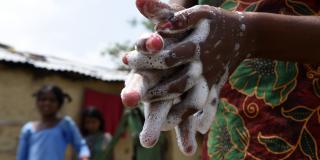
We're rapidly adapting our work to ensure we do all we can to keep people safe and well – both during this crisis, and in the challenging months to come, when we know the impact on routine health services will be felt the hardest.
Frontline healthcare professionals and community volunteers are already at the heart of our programmes; now, we’re also equipping them with the knowledge they need to stay healthy, identify COVID-19 symptoms, and educate even the hardest-to-reach populations on how to limit transmission.
We know that the wider impacts of COVID-19 on fragile health systems will be long-lasting and far-reaching – and it will be the most vulnerable who are the worst affected.
As lockdowns continue around the world, and fear of infection stops people from accessing health facilities, routine services – including family planning, antenatal care, and childhood immunisation – are disrupted. With attention and resources focused on the immediate crisis, the risk is that many of these essential services will be further neglected.
Continuing essential care
It’s essential we don’t forget that, even in the midst of a global pandemic, women will still give birth, people living with HIV must still access life-saving medication, and young people still need essential advice on sexual and reproductive health.
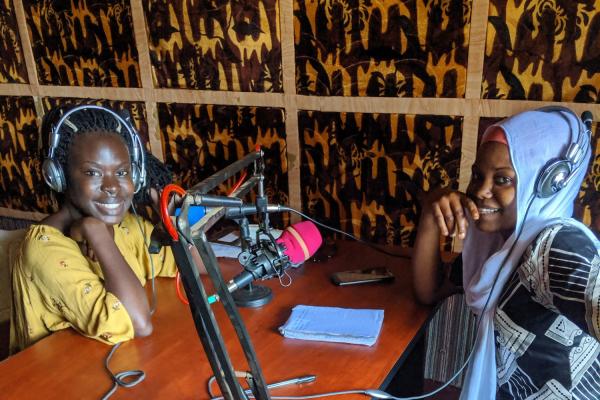
We’re continuing to work with the most marginalised and hard-to-reach populations, supporting them to access the care they need to stay healthy – both during this crisis and beyond.
Reaching young people over the airwaves
We know that issues like teenage pregnancy and gender-based violence are heightened in times of crisis, especially when schools are closed for long periods.
In the rural Mwanza region of Tanzania, VSO community volunteers have adapted their regular youth-focused interactive theatre productions – currently on hold due to physical distancing regulations – into radio shows, now sharing COVID-19 messaging alongside much-needed advice and discussion about young people’s sexual and reproductive health.
Helping babies get a safer start
During large-scale health crises, public trust in existing systems can be damaged, meaning people are less likely to seek the care they need, even if it’s available.
During the 2014 Ebola outbreak in Sierra Leone, fear of infection meant that many pregnant women and mothers avoided clinics and health centres, leading to an increase in potentially dangerous home births and a drop in the number of children receiving essential immunisations. To combat this, we took a two-pronged approach: training rural health workers to reassure concerned women, whilst empowering community volunteers to share essential messages and encourage people to visit clinics.
Now, we’re adopting the same approach to counter the fear and dangerous misinformation surrounding COVID-19. In Tanzania, Ethiopia and Sierra Leone, we’re training health workers to carry on delivering services safely, whilst working through our networks of volunteers to encourage women to seek antenatal care, give birth in facilities, and bring their children for life-saving vaccinations.
Reaching the most vulnerable with life-saving information
Our health programmes have always focused on supporting some of the hardest-to-reach people; now, we’re using our unique understanding of local communities and well-established networks to make sure that we share essential COVID-19 information with those who are often overlooked.

As well as using digital tools such as social media to engage with thousands of people, we’re making sure that essential public health messages are reaching people living in even the remotest areas, who don’t have internet access:
- we’re broadcasting via community radio in Pakistan, Malawi, Sierra Leone, Tanzania, and Zambia
- we’ve equipped volunteers in Malawi, Sierra Leone and Tanzania with megaphones so they can safely spread messages in residential areas, without having to enter people’s homes
- we’ve trained moto-taxi drivers in Tanzania to strike up COVID-focused conversation – safely – with their passengers
- in Sierra Leone, emergency response volunteers are travelling to remote villages that are inaccessible by road and cut off from usual information channels. They’re using innovative and interactive approaches, including drama, skits and songs, to communicate with people who aren’t able to read official guidance.
Our volunteers are uniquely placed to be able to identify and engage with the most at-risk people in their neighbourhood – and where it’s safe to do so, they’re still working at the heart of hard-to-reach communities:
- in Tanzania, youth volunteers are going door to door in rural villages to explain the importance of measures such as hand washing and physical distancing
- in Sierra Leone, VSO-trained volunteers, who were already supporting the Office of National Security to prepare for natural hazards, are now applying their skills to fighting COVID-19. Trusted and held in high regard by local communities, these ‘social mobilisers’ are able to combat the spread of dangerous misinformation and raise awareness of how to prevent infection.
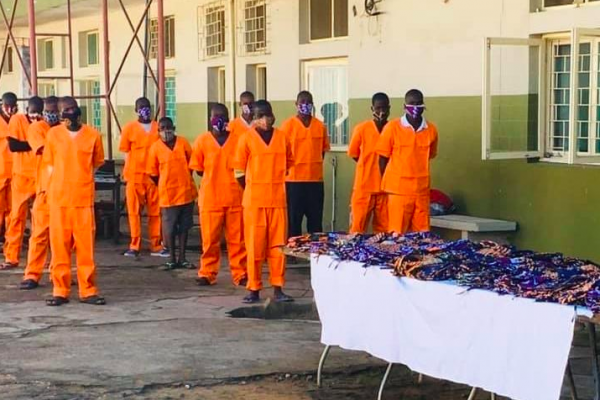
Supporting prison populations to stay healthy
Across Zambia, Zimbabwe, eSwatini and Malawi, we’re incorporating awareness-raising around COVID-19 into our ongoing work improving the health and wellbeing of prison populations. By providing inmates and officers with accurate and up-to-date information, we’re supporting some of the countries’ most vulnerable and overlooked populations to stay safe and well whilst spending time in dangerously overcrowded facilities.
In Mozambique, we're supporting inmates in dangerously overcrowded prisons to produce cloth masks to improve safety, whilst also developing new skills, ready for life after release.
Ensuring people living with disabilities aren’t left behind
People living with disabilities often face additional barriers to realising their rights to healthcare, including stigma, limited understanding of their needs, and the challenge of physically accessing services.
Now more than ever, we're working to ensure that potentially life-saving interventions are accessible to everyone:
- In Rwanda, we’re working with volunteers, community representatives and the Rwanda Union for the Deaf to adapt official information into sign language videos and establish a video call hotline.
- In Cambodia, we’ve worked with youth volunteers and members of the ICS National Youth Engagement Network to produce posters on essential COVID-19 prevention in braille.
- In Malawi, we’re collaborating with the government to reach thousands of people with disabilities and their personal assistants with targeted messaging around COVID-19 prevention, transmission and referral systems.
- In Nigeria, we’re supporting the government to deliver tailored awareness-raising and prevention messages to people living with disabilities.
- In Pakistan, we’re running radio campaigns to support people with disabilities to realise their rights to healthcare during the pandemic.
Strengthening systems and building future resilience
We're focusing much of our efforts on looking ahead to the post-crisis phase of this pandemic, when we know that its impact on routine services will be felt the hardest. We’re considering how systems will be affected in the months to come, and planning now for how we can mitigate the challenges ahead.
We’re continuing our ongoing work to strengthen the capacity of health systems to deliver the essential services that are now under increased strain, and to develop resilience at multiple levels – both now, and in the longer term.
At the policy level, we’re advocating for the maintenance of critical services, and collaborating with other agencies to support governments as they develop new protocols and guidelines.
Find out more

Volunteer field reports from a global pandemic
With most VSO volunteers staying in placement to help tackle COVID-19, three of them share first-hand perspectives on what they are seeing on the ground now.
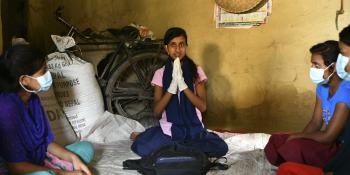
The power of volunteering vs COVID-19 in 10 photos
There's been a spontaneous outpouring of goodwill as communities all over the world have come together to fight COVID-19. Our photo gallery shows how volunteers are tackling the pandemic, thanks to the support of UK Aid.
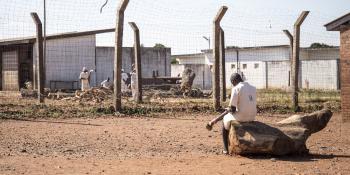
Improving the health and wellbeing of prison populations in Southern Africa
Improving prison health through an innovative combination of volunteer peer support, skills training, and advocating for change.
